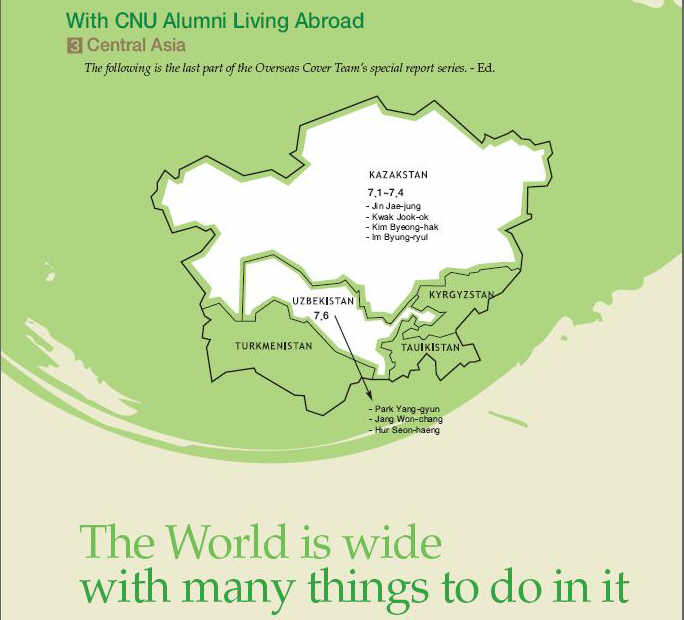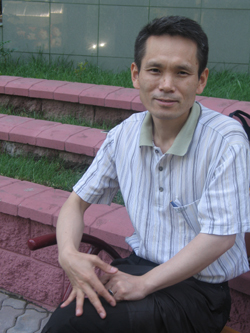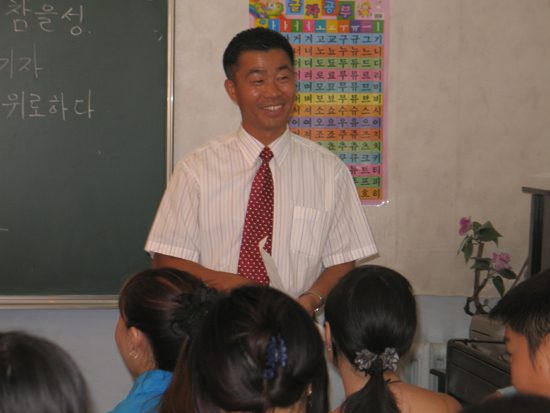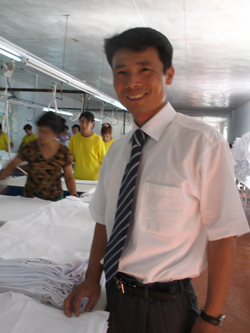<#275 Feature>
The following is the last part of the Overseas Cover Team (OCT)’s special report series. In this issue, the Overseas Cover Third Team (OCTT) deals with CNU alumni living in Central Asia. The team members departed Korea for Kazakhstan on June 30, 2006, looking forward to seeing new CNU alumni. Let’s meet them. - Ed.
“Find something worthwhile in your life. Your success depends on your mind”
The OCTT met Kim Byeong-hak (professor, Dept. of Korean Language at Almata National University) on July 4th 2006. He welcomed us with a bright smile. He entered the department of Public Administration in 1984, but he was not been interested in his major.

One day after graduation, he heard that Goryeoin, which refers to, ethnic Koreans residing Kazakhstan in Central Asia, wanted to learn Korean language from his professor.
Inspired by his professor’s talk, he decided to go there. So at twenty years-old in 1992, he moved to Kazakhstan to teach the Goryeoin.
After arriving in Kazakhstan, he became a teacher at Gwangju Korean Language School in Ushtobe. During those days, he suffered from a certain mental disconnection and food problems while living with the Goryeoin there.
However, he could readily understand their life and pain. He first planned to stay there only one year, but while he was a lecturer of the Dept. of Korean Language at Almata National University, he heard that students talk about their situation, that is to say, many Korean teachers had already left and if he left them as well, they would no longer be able to study Korean.
He then decided not to leave Kazakhstan. Since then he has taught in many other regions of Kazakhstan but during these fifteen years he has always remained in the same office.
For fifteen years, he has made an effort to provide Goryeoin with Korean language education and carry out his cultural studies. He was also a reporter for four years from 2000 .for the Goryeo Daily News, written in Korean. He considered it regretful that the Goryeo Daily News no longer appealed to its subscribers went into decline.
He has been working as a researcher at the Koreanology Center of Kazakhstan and plans to make a compilation about Korean folk songs among Goryeoins.
When the OCTT asked him why he edited the folk songs, he answered, “I have been collecting the lyrics of folk songs. I believe that the Goryeoin are also Korean. So, I hope that they know their songs and language and remember their traditional Korean culture.”
Finally, he said to CNU-ians. “I have a good creed for my life. That is, material benefits aren’t important for me to be happy. Real happiness comes from a stable mind. Find something worthwhile in your life and its success will depend on your mind.”
“You must have a willingness to venture into unknown territories”

Next day, the OCTT met Hur Seon-haeng in Tashkent, the capital of Uzbekistan. Though he entered the Dept. of Ethics Education in 1985, he, as principal, currently operates Sejong Korean Language School in Tashkent. Uzbekistan is so far from Korea and not familiar to us.
We asked him why and when he came to Uzbekistan. He answered that in 1992 just like Byeong-hak, one day he heard from his professor that the Goryeoin living in Soviet Russia under communism urgently needed Korean language education. At that moment, he was so inspired that he decided to move to Uzbekistan.
Though he was a very passionate teacher, he was worried how to teach the Korean language to students in a different nation. He recruited students who wanted to study Korean language through advertisements in Russian newspaper.
As his students learned Korean, they became interested in Koreanology. At that time, competition to enter the Sejong Korean School was very high at a rate of five to one. He said that Goryeoin students were very thirsty for learning Korean and took a great interest in it.
Although students were very eager to learn the language, learning conditions for them were not good. Whenever it rained, the roof of the school leaked and water seeped in. They used catch the rainwater in buckets. The classroom also had no electric fans or air conditioners.
They faced the worst place for learning and studying. He made efforts in various ways in order to get the requisites, but he didn’t always have success with this. Despite of really bad situation, he has been able to stay there for fourteen years due to his students’ enthusiasm about studying Korean.
Before he married, students used to bring some food and put it in his refrigerator. He said that he still kept the refrigerator and it was very significant and unforgettable.
He added, “I always emphasize politeness to my students while saying though you are not good at speaking Korean, you should be polite students. The most important thing is courtesy. And I hope students feel at home when they are in Sejong School and also I hope this school plays a role as a Mecca of Korean language education.”
Finally, he left with this message to CNU-ians, “Uzbekistan seems to one of the underdeveloped countries, but if you come here, you notice that it has a lot of work which you can do. I devoted myself to teaching Korean and I’ve never regretted that. What I really want to say to my juniors is to concentrate on your happiness and satisfaction through your job or work. Not money!”
“Let’s go to the world with challenging spirit”

He is the chairman of the company, which currently commands an 80 percent share of the textile manufacturing market in Central Asia.
His major was Agricultural Biology, but he immigrated to Uzbekistan in 1998 after meeting his junior who had been to Uzbekistan.
At that time, many people in Korea suffered from the IMF financial crisis.
After arriving in Uzbekistan, he did many office jobs such as in cosmetics and agricultural products sales, but it was hard to make money through these. Therefore, he started to run a cotton spinning company in 2002.
The reason was that he thought the business looked very promising as the cotton plant is the main product in Uzbekistan. He has done his best in operating the company since then.
He told us. “The most impressive and unforgettable thing was traveling in Turkmenistan. Through this traveling, I learned and experienced many things.
I wish to recommend traveling throughout the world. But now I have little time to travel because of business commitments and drinking parties. Hard and tough traveling gave me a power to endure difficult times here. I hope CNU-ians experience as many things as they possibly can.”
On the other hand, he added that the most difficult things are the custom and cultural differences between Korea and Uzbekistan. He faced further difficulties with the language barrier. He is still studying Russian. He advised us, “You should study foreign languages. The more languages you know, the more opportunities you will come across”
He also said, “Enhance your linguistic ability. It is important for you to get good job opportunities. The world is wide with many things to do in it. You’ should be broadminded instead of sticking to narrow insignificant things.”
While the OCTT were in Kazakhstan and Uzbekistan, this reporter felt that these two countries are not developing ones any more. Before leaving Kazakhstan and Uzbekistan, the OTCC members had good feelings about these countries and thought they were full of abundant resources and expansive facilities.
Many people tend to think that they should go to advanced countries for a brighter future. It might be better to forget those ideas! Kazakhstan and Uzbekistan seem to be lands of more opportunities than advanced countries.
Make strong efforts to prepare yourself, and you may discover much work to do. Success depends totally on your-self. You need to have a challenging spirit to make it in unknown distant lands. Let’s step confidently forward out into the world with a challenging spirit.
-------------------------------------------------------------------
In addition to the above 3 alumni, OCTT covered the following:
Kazakhstan
Jin Jae-jung(Vice President of Dae Jong Company)
Kwak Joon-ok (Embassy of the Republic of Korea in Uzbekistan)
Im Byung-ryul( President of Dae Jong Company)
Uzbekistan
Jang Won-chang (Vice President Korean Education Center)
Period : June 30 ~ July 10 , 2006 (11 days and 10 nights)
Overseas Cover Third Team (OCTT) :
Lee ji-na (CNU Brodcasting)
Jang Ok-hee (CNU Weekly)
Kim Bo-a (Chonnam Tribune)

